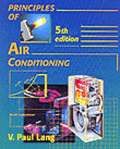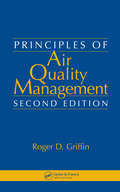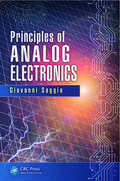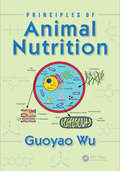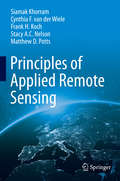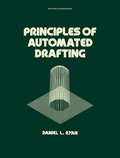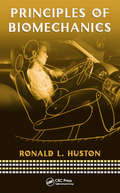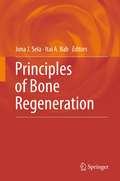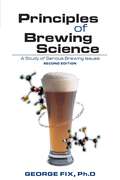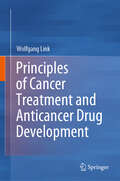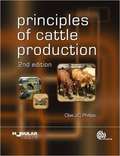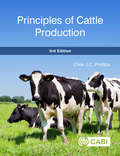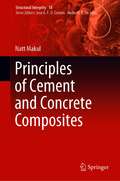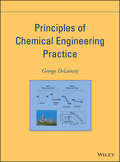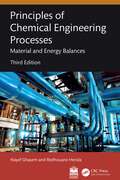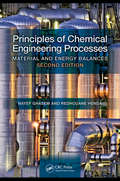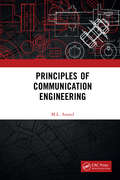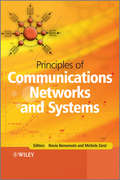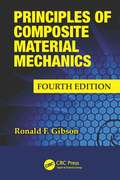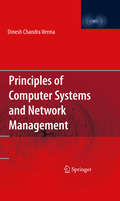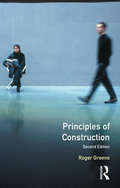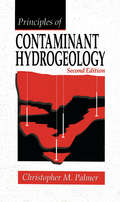- Table View
- List View
Principles of Air Conditioning (5th Edition)
by V. Paul LangThis proven text, now in its fifth edition, covers the fundamental principles of refrigeration and air conditioning. The material is intended to help learner develop practical skills required in all areas of A/C applications; design, installation, sales, & service. The technical information presented is fundamental to all types of domestic & commercial systems.
Principles of Air Quality Management
by Roger D. GriffinBlending information from popular mainstream articles, highly technical publications, and research journals, the second edition of Principles of Air Quality Management features new sections on air toxics, new information on chronic and acute health effects, and new approaches to the assessment of those impacts on sensitive populations. It em
Principles of Analog Electronics
by Giovanni SaggioRichly illustrated in full color, this textbook introduces you to the fascinating world of analog electronics, where fields, circuits, signals and systems, and semiconductors meet. The author expertly blends theory with practical examples to give a clear understanding of how real electronic circuits work. The book reviews the prerequisite mathematics, physics, and chemistry and the theory of circuits before delving into passive and active electronic devices. Taking a fresh approach, it connects electronics to everyday life through interesting observations, key personalities, and real-world applications.
Principles of Animal Nutrition
by Guoyao WuAnimals are biological transformers of dietary matter and energy to produce high-quality foods and wools for human consumption and use. Mammals, birds, fish, and shrimp require nutrients to survive, grow, develop, and reproduce. As an interesting, dynamic, and challenging discipline in biological sciences, animal nutrition spans an immense range from chemistry, biochemistry, anatomy and physiology to reproduction, immunology, pathology, and cell biology. Thus, nutrition is a foundational subject in livestock, poultry and fish production, as well as the rearing and health of companion animals. This book entitled Principles of Animal Nutrition consists of 13 chapters. Recent advances in biochemistry, physiology and anatomy provide the foundation to understand how nutrients are utilized by ruminants and non-ruminants. The text begins with an overview of the physiological and biochemical bases of animal nutrition, followed by a detailed description of chemical properties of carbohydrates, lipids, protein, and amino acids. It advances to the coverage of the digestion, absorption, transport, and metabolism of macronutrients, energy, vitamins, and minerals in animals. To integrate the basic knowledge of nutrition with practical animal feeding, the book continues with discussion on nutritional requirements of animals for maintenance and production, as well as the regulation of food intake by animals. Finally, the book closes with feed additives, including those used to enhance animal growth and survival, improve feed efficiency for protein production, and replace feed antibiotics. While the classical and modern concepts of animal nutrition are emphasized throughout the book, every effort has been made to include the most recent progress in this ever-expanding field, so that readers in various biological disciplines can integrate biochemistry and physiology with nutrition, health, and disease in mammals, birds, and other animal species (e.g., fish and shrimp). All chapters clearly provide the essential literature related to the principles of animal nutrition, which should be useful for academic researchers, practitioners, beginners, and government policy makers. This book is an excellent reference for professionals and a comprehensive textbook for senior undergraduate and graduate students in animal science, biochemistry, biomedicine, biology, food science, nutrition, veterinary medicine, and related fields.
Principles of Applied Remote Sensing
by Siamak Khorram Frank H. Koch Cynthia F. van der Wiele Stacy A. C. Nelson Matthew D. PottsThis textbook is one of the first to explain the fundamentals and applications of remote sensing at both undergraduate and graduate levels. Topics include definitions and a brief history of payloads and platforms, data acquisition and specifications, image processing techniques, data integration and spatial modeling, and a range of applications covering terrestrial, atmospheric, oceanographic and planetary disciplines. The policy and law issues of remote sensing and the future trends on the horizon are also covered. Remote sensing is an exciting, dynamic technology that is transforming the Earth sciences - terrestrial, atmospheric, and marine - as well as the practices of agriculture, disaster response, engineering, natural resources, providing evidence in legal cases and documented humanitarian crises, and many other fields. Increasingly, understanding of these techniques will be central to a number of disciplines, particularly as the technology advances.
Principles of Automated Drafting (Mechanical Engineering Ser. #28)
by Daniel L. RyanThis book introduces the reader to each phase of the subject, step-by-step to enable one to use the various automated drafting devices, instruments and technique of application. It shows the way to produce acceptable drafting in the framework of high productivity.
Principles of Biomechanics
by Ronald HustonResearch and study in biomechanics has grown dramatically in recent years, to the extent that students, researchers, and practitioners in biomechanics now outnumber those working in the underlying discipline of mechanics itself. Filling a void in the current literature on this specialized niche, Principles of Biomechanics provides readers with a so
Principles of Bone Regeneration
by Jona J. Sela Itai A. BabPrinciples of Bone Regeneration is a timely publication that addresses the modern aspects of bone healing and repair. This exciting new volume details the convergence of the different experimental and clinical approaches designed for the study and treatment of bone healing in its diverse forms and under varying conditions. Bone healing is affected by a multitude of genetic, environmental, mechanical, cellular and endocrine variables which eventually lead to changes in gene expression that enhance the guided action of osteoblasts (and chondroblasts) to lay down bone that restores, or even improves, the skeletal load bearing capacity. Recent breakthroughs in understanding the regulatory aspects of bone formation and resorption, in both research and clinical arenas offer new modalities to induce, enhances and guide repair processes in bone for the benefit of millions of patients with conditions such as nonunion fractures, critical size defects, orthodontic tooth movement, periodontal bone loss, intraosseous implants and deformed bones.
Principles of Brewing Science: A Study of Serious Brewing Issues
by George FixPrinciples of Brewing Science is an indispensable reference which applies the practical language of science to the art of brewing. As an introduction to the science of brewing chemistry for the homebrewer to the serious brewer&’s desire for detailed scientific explanations of the process, Principles is a standard addition to any brewing bookshelf.
Principles of Cancer Treatment and Anticancer Drug Development
by Wolfgang LinkThis book explains how current medicines against cancer work and how we find new ones. It provides an easy-to-understand overview of current options to treat patients with cancer, which includes Surgery, Radiation therapy, Chemotherapy, Targeted therapy and Immunotherapy. The efficiency of all these treatments is limited by the capacity of cancer cells to escape therapy. This book explains the mechanisms of anti-cancer drug resistance and strategies to overcome it. The discovery and development process of a new drug is detailed beginning with the identification and validation of a therapeutic target, the identification of an inhibitor of the target and its subsequent preclinical and clinical development until its approval by regulatory authorities. Particular emphasis has been given to specific aspects of the development process including lead generation and optimization, pharmacokinetics, ADME analysis, pharmacodynamics, toxicity and efficacy assessment, investigational new drug (IND) and new drug application (NDA) and the design of clinical trial and their phases. The book covers many aspects of modern personalized oncology and discusses economic aspects of our current system of developing new medicines and its impact on our societies and on future drug research. The author of this book, Dr. Link counts with more than 20 years of experience in biomedical research reflected in numerous publications, patents and key note and plenary presentations at international conferences. Interested readers, students and teachers should read this book as it provides a unique way to learn/teach about basic concepts in oncology and anti-cancer drug research.
Principles of Cattle Production
by Clive PhillipsThis introductory level textbook covers the welfare and environmental implications of producing cattle as well as traditional subjects such as nutrition, reproduction and housing. Its broad, international coverage includes feedlot systems, transport, subsistence farming systems and the contribution of cattle production systems to land, air and water pollution. It is an invaluable resource for undergraduate students of animal science, veterinary medicine and agriculture, as well as diploma and certificate courses and industry personnel.
Principles of Cattle Production
by Clive PhillipsCompletely updated and revised, the new edition of Principles of Cattle Production continues to provide an introductory level text for all interested in dairy and beef cattle production systems. This edition presents a vision for a cattle industry that addresses issues about impacts on the environment, the welfare of cattle and the provision of safe and high quality food for an increasingly demanding world population. The new edition: - Is expanded to include more on animal welfare, sustainability and production systems in low and middle income countries, including smallholder production systems. - Has undergone a thorough review of all the existing chapters, with new content on the future role of cattle. - Contains quality colour illustrations, so that key information can be found at a glance. - Is beautifully written with many examples and pointers for further information. - Tackles key issues of sustainability and the requirement for increased production. - Now contains helpful exercises and other resources for students and their teachers to consider the role of cattle in the world today and in the future. Principles of Cattle Production 3rd Edition continues to provide a comprehensive yet concise overview for all undergraduate students of animal science, agriculture, veterinary medicine, animal welfare and industry personnel.
Principles of Cattle Production
by Clive PhillipsCompletely updated and revised, the new edition of Principles of Cattle Production continues to provide an introductory level text for all interested in beef and dairy cattle production systems. This edition presents a vision for a cattle industry that addresses the environment, the welfare of cattle and the provision of safe and high quality food for an increasingly demanding world population. The new edition: - Is expanded to include more on animal welfare, sustainability and production systems in low and middle income countries, including smallholder production systems. - Has undergone a thorough review of all the existing chapters with new content on breeding cattle and the future role of cattle. - Contains quality colour illustrations, so that key information can be found at a glance. - Is beautifully written with many examples and pointers for further information. - Tackles key issues of sustainability and the requirement for increased production. Principles of Cattle Production 3rd Edition continues to provide a comprehensive yet concise overview for all undergraduate students of animal science, agriculture, veterinary medicine, animal welfare and industry personnel.
Principles of Cement and Concrete Composites (Structural Integrity #18)
by Natt MakulThis book presents an introduction, a discussion of the concept of the design and the concrete’s development, and the properties and testing of the concrete in fresh and hardened stages. After an introduction to the principles of cement and concrete composites, the reader will find information on the principles of quantum-scaled cement, low-carbon cement, fiber-reinforced concrete, reactive powder concrete, and tailor-made recycled aggregate concrete.
Principles of Chemical Engineering Practice
by George DelanceyEnables chemical engineering students to bridge theory and practiceIntegrating scientific principles with practical engineering experience, this text enables readers to master the fundamentals of chemical processing and apply their knowledge of such topics as material and energy balances, transport phenomena, reactor design, and separations across a broad range of chemical industries. The author skillfully guides readers step by step through the execution of both chemical process analysis and equipment design.Principles of Chemical Engineering Practice is divided into two sections: the Macroscopic View and the Microscopic View. The Macroscopic View examines equipment design and behavior from the vantage point of inlet and outlet conditions. The Microscopic View is focused on the equipment interior resulting from conditions prevailing at the equipment boundaries. As readers progress through the text, they'll learn to master such chemical engineering operations and equipment as:Separators to divide a mixture into parts with desirable concentrationsReactors to produce chemicals with needed propertiesPressure changers to create favorable equilibrium and rate conditionsTemperature changers and heat exchangers to regulate and change the temperature of process streamsThroughout the book, the author sets forth examples that refer to a detailed simulation of a process for the manufacture of acrylic acid that provides a unifying thread for equipment sizing in context. The manufacture of hexyl glucoside provides a thread for process design and synthesis.Presenting basic thermodynamics, Principles of Chemical Engineering Practice enables students in chemical engineering and related disciplines to master and apply the fundamentals and to proceed to more advanced studies in chemical engineering.
Principles of Chemical Engineering Processes: Material and Energy Balances
by Nayef Ghasem Redhouane HendaPrinciples of Chemical Engineering Processes: Material and Energy Balances continues to serve an essential text, guiding students on the basic principles and calculation techniques used in the field of chemical engineering and providing a solid understanding of the fundamentals of the application of material and energy balances. This third edition has been updated to reflect advances in the field and feedback from professors and students. Packed with illustrative examples and case studies, this book:• Features learning objectives and homework problems in every chapter, new material on software modeling, and additional and enhanced solved examples and problems.• Discusses problems in material and energy balances related to chemical reactors and explains the concepts of dimensions, units, psychrometry, steam properties, and conservation of mass and energy.• Demonstrates how Python, MATLAB®, and Simulink® can be used to solve complicated problems of material and energy balances, and now features an introduction to the basics of building Simulink models.• Demonstrates how Python and its libraries, such as NumPy and SciPy, can be used to solve complex problems in material and energy balances, and introduces the basics of building models using Python frameworks similar to Simulink.• Shows how to solve steady-state and transient mass and energy balance problems involving multiple-unit processes and recycle, bypass, and purge streams.• Develops quantitative problem-solving skills, specifically the ability to think quantitatively (including numbers and units), the ability to translate words into diagrams and mathematical expressions, the ability to use common sense to interpret vague and ambiguous language in problem statements, and the ability to make judicious use of approximations and reasonable assumptions to simplify problems.• Offers educational software and sample tutorials and quizzes for download.Aimed at both chemical engineering students and professionals, this book helps readers understand how to calculate, manage, and apply the key ideas of material and energy use in chemical processes through real-world examples. Lecture slides and a solutions manual are available with qualifying course adoption.
Principles of Chemical Engineering Processes: Material and Energy Balances, Second Edition
by Nayef Ghasem Redhouane HendaPrinciples of Chemical Engineering Processes: Material and Energy Balances introduces the basic principles and calculation techniques used in the field of chemical engineering, providing a solid understanding of the fundamentals of the application of material and energy balances. Packed with illustrative examples and case studies, this book:Discuss
Principles of Chemical Separations with Environmental Applications
by Richard D. Noble Patricia A. TerryThis introduction to chemical separations technology presents the chemical and/or physical basis of different techniques and explains how to evaluate them for design and analysis. Chemical separations are of central importance in many areas of environmental science, whether it is cleaning up polluted water or soil, the treatment of discharge streams from chemical processes, or modification of a specific process to decrease its environmental impact. This textbook is suitable for undergraduate and graduate students taking courses on environmental separations or environmental engineering. Many worked examples and over 100 homework problems are key highlights.
Principles of Cognitive Radio
by Ezio BiglieriWidely regarded as one of the most promising emerging technologies for driving the future development of wireless communications, cognitive radio has the potential to mitigate the problem of increasing radio spectrum scarcity through dynamic spectrum allocation. Drawing on fundamental elements of information theory, network theory, propagation, optimisation and signal processing, a team of leading experts present a systematic treatment of the core physical and networking principles of cognitive radio and explore key design considerations for the development of new cognitive radio systems. Containing all the underlying principles you need to develop practical applications in cognitive radio, this book is an essential reference for students, researchers and practitioners alike in the field of wireless communications and signal processing.
Principles of Communication Engineering
by M.L. AnandThis is the book, in which the subject matter is dealt from elementary to the advance level in a unique manner. Three outstanding features can be claimed for the book viz. (i) style; the student, while going through the pages would feel as if he is attending a class room. (ii) language: that an average student can follow and (iii) approach: it takes the student from ''known to unknown'' and ''simple to complex.'' The book is reader friendly, thought provoking and stimulating. It helps in clearing cobwebs of the mind. The style is lucid and un-adulterated. Unnecessary mathematics has been avoided. Note: T&F does not sell or distribute the Hardback in India, Pakistan, Nepal, Bhutan, Bangladesh and Sri Lanka.
Principles of Communications Networks and Systems
by Nevio Benvenuto Michele ZorziAddressing the fundamental technologies and theories associated with designing complex communications systems and networks, Principles of Communications Networks and Systems provides models and analytical methods for evaluating their performance. Including both the physical layer (digital transmission and modulation) and networking topics, the quality of service concepts belonging to the different layers of the protocol stack are interrelated to form a comprehensive picture.The book is designed to present the material in an accessible but rigorous manner. It jointly addresses networking and transmission aspects following a unified approach and using a bottom up style of presentation, starting from requirements on transmission links all the way up to the corresponding quality of service at network and application layers. The focus is on presenting the material in an integrated and systematic fashion so that students will have a clear view of all the principal aspects and of how they interconnect with each other.A comprehensive introduction to communications systems and networks, addressing both network and transmission topicsStructured for effective learning, with basic principles and technologies being introduced before more advanced ones are explainedFeatures examples of existing systems and recent standards as well as advanced digital modulation techniques such as CDMA and OFDMContains tools to help the reader in the design and performance analysis of modern communications systemsProvides problems at the end of each chapter, with answers on an accompanying website
Principles of Composite Material Mechanics (Mechanical Engineering Series)
by Ronald F. GibsonPrinciples of Composite Material Mechanics covers a unique blend of classical and contemporary mechanics of composites technologies. It presents analytical approaches ranging from the elementary mechanics of materials to more advanced elasticity and finite element numerical methods, discusses novel materials such as nanocomposites and hybrid multis
Principles of Computer Systems and Network Management
by Dinesh Chandra VermaSystems Management is emerging as the predominant area for computer science in the enterprise, with studies showing that the bulk (up to 80%) of an enterprise IT budget is spent on management/operational issues and is the largest piece of the expenditure. This textbook provides an overview of the field of computer systems and network management. Systems management courses are being taught in different graduate and undergraduate computer science programs, but there are no good books with a comprehensive overview of the subject. This text book will provide content appropriate for either an undergraduate course (junior or senior year) or a graduate course in systems management.
Principles of Construction
by Roger GreenoPrinciples of Construction is an illustrated guide to the processes involved in a building programme, from inception stage through to completion. This second edition has been updated in accordance with current Building Regulation, with the emphasis remaining on safety and the correct use of materials.Following a logical procession of concepts and practice, the book includes details of the various aspects of elementary construction and offers an insight into the techniques applied in larger scale projects using standard steel sections and reinforced concrete. Other procedures covered include undertaking a structural survey, recognising structural defects and carrying out remedial treatment.
Principles of Contaminant Hydrogeology
by Christopher M. PalmerThis second edition features new and expanded coverage of contaminant hydrogeologic investigations. It presents a practical approach to completing investigations for environmental compliance, emphasizing the use of geologic principles in assessment to move sites toward cleanup. Stressing the basics of collecting data that can withstand regulatory scrutiny and achieve remediation, Principles of Contaminant Hydrogeology, Second Edition demonstrates how to solve a client's site contamination problem while maximizing cost effectiveness. It focuses on small- and medium-sized firms, for which speed, accuracy, and cost are all crucial factors in the site assessment and closure process. Based on "real world" problems, the book takes you step-by-step through the investigation and includes client-consultant-regulator interaction, budgets, ethics, and data extrapolation for solving problems. It introduces concepts such as field logistics, drilling techniques, sampling protocols, contaminant movement, and remediation. Regulatory personnel, hydrogeological consultants, drilling contractors, remediation contractors, university instructors, and students will benefit from the wealth of information provided in this new edition.
